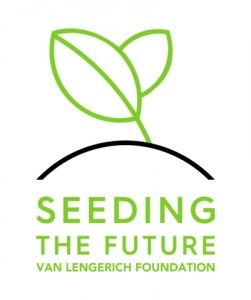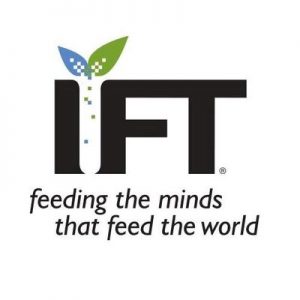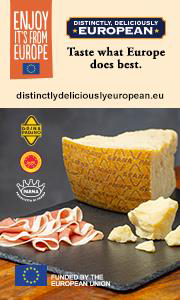Deadline Nears for 2024 Seeding The Future Challenge
 The 2023 Seeding The Future Global Food System Challenge, funded and initiated by the Seeding The Future Foundation and hosted by the Institute of Food Technologists, attracted over 900 submissions from 78 countries. Scientists, engineers, entrepreneurs, and multidisciplinary teams showcased their groundbreaking innovations addressing critical food system challenges.
The 2023 Seeding The Future Global Food System Challenge, funded and initiated by the Seeding The Future Foundation and hosted by the Institute of Food Technologists, attracted over 900 submissions from 78 countries. Scientists, engineers, entrepreneurs, and multidisciplinary teams showcased their groundbreaking innovations addressing critical food system challenges.
Ultimately, 13 winners were awarded a total of $1 million in prize funding: Eight Seed Grant winners ($25,000 each), three Growth Grant winners ($100,000 each), and two Seeding The Future Grand Prize winners ($250,000 each).
“Last year’s winners again demonstrated an incredible level of ingenuity and commitment in addressing the most pressing issues facing food systems globally,” said Bernhard van Lengerich, founder of the Seeding The Future Foundation. “The submissions we’ve received this year have been outstanding, and we are inspired by their novelty and significant impact potential on people’s lives and the environment.”
Applications for the 2024 Challenge opened on Nov. 1 and close on Jan. 6. To learn more or to submit an application, click here or to go www.ift.org/food-system-challenge.
New this year, applicants who pass the first phases of the review process or reached at least semifinal level in another food system competition can earn a spot in the Seeding The Future Global Food System Innovation Database and Network. This peer-reviewed, interactive database will showcase innovations to global organizations such as the United Nations Food and Agriculture Organization and the World Food Programme, as well as philanthropic organizations and the investment community, fostering opportunities for funding and collaboration.
Reflections from 2023 Winners:
International Food Policy Research Institute (HarvestPlus) – Seeding The Future Grand Prize Winner
Innovation: By using nutrient-dense, climate-smart crops, HarvestPlus addresses Zambia’s high rates of Vitamin A deficiency. These porridges support child development, reduce health risks, and improve likelihoods for farming families. Through the Seeding The Future Foundation grant, HarvestPlus is developing nutrient-rich flour formulas and food products for school feeding programs that will provide tasty, ready-made, nutrient-rich meals that contribute to the nutritional health of learners, particularly young and adolescent girls.
“The Seeding The Future Global Food System Challenge prize has given HarvestPlus a huge opportunity to showcase the value of biofortification – from production to consumption. The prize has greatly emphasized the relevance of our work in addressing food and nutrition security with biofortified crops as one significant strategy for change,” said Katharine Diehl, PhD, scaling specialist, HarvestPlus. “With the grant, we can now significantly accelerate the availability of nutritious food in Zambia, helping address nutritional deficiencies that prevent children from reaching their full potential.”
Learn more at www.harvestplus.org.
Naandi Foundation – Seeding The Future Grand Prize Winner
Innovation: Regenerative agriculture model (ReGen) in India. Naandi Foundation’s approach helps farmers transition from chemical-based farming to biodiversity-focused regenerative practices, improving soil and crop health.
Learn more at www.naandi.org.
Nurture Posterity International (NutriPosh) – Growth Grant Winner
Innovation: Affordable composite flour for school feeding programs in Uganda. The grant enabled expansion to 297 schools, feeding over 240,000 children while supporting 2,700 farmers in adopting regenerative practices.
“Nurture Posterity International’s recognition as a Growth Grant winner has brought significant attention to the organization while recognizing the importance of creating an environmentally sustainable value chain around the provision of affordable, safe, and trusted pumpkin seed enriched composite maize flours for school feeding programs in Uganda,” said Ibrahim Kasujja, managing director, Nurture Posterity International. “The grant helped our team to significantly accelerate our efforts to help schools switch to these composite flours with a better nutrient profile while transitioning away from using maize flours with a better nutrient profile while transitioning away from using maize flours that lack important nutrients known to improve cognitive health. Our team is so incredibly grateful to the Seeding The Future Foundation.”
Learn more at www.npi-ssa.org.
Association 3535 – Growth Grant Winner
Innovation: Solar-powered cooling hubs for farmers in Sub-Saharan Africa. By reducing post-harvest losses, this initiative enhances food security and farmer incomes.
Learn more at www.association3535.com.
Kopernik – Growth Grant Winner
Innovation: Indigenous farming practices and waste conversion in Indonesia. Through composting and circular economy approaches, Kopernik fosters climate-resilient food systems.
Kopernik was recognized for its Pangan Initiative, addressing food insecurity in West Timor, Indonesia. By adopting an innovative approach that prioritizes the return to and use of indigenous farming practices, food preservation technologies, and a circular economy approach utilizing black soldier flies to convert organic and food waste into animal feed and compost for farming, the Pangan Initiative will create a more climate-resilient and self-sustaining food system and community.
Learn more at www.kopernik.info.
Ndalo Heritage Trust – Seed Grant Winner
Innovation: Sorghum-based composite flour enriched with climate-smart crops to combat malnutrition in Siaya, Kenya. This flour made from locally available crops like amaranth, sweet potatoes, and pumpkin seeds, addresses micronutrient deficiencies in expectant mothers and children, promoting cognitive and physical development while reducing anemia and stunting risks. The innovation promotes both nutritional health and agricultural diversification, empowering communities to combat the impacts of climate change.
“Winning the Seeding The Future Global Food System Challenge meant a stamp of global approval for our innovation,” said Erich Midigo, founder and CEO, Ndalo Heritage Trust. “What makes this innovation impactful is its simplicity and scalability. This low-cost, community-driven model has the potential to be replicated across regions facing similar challenges of malnutrition.”
Learn more at www.ndaloheritage.co.ke.
UV4Good – Seed Grant Winner
Innovation: Portable UVC LED-based water disinfectant systems for emergency and field use. These systems provide clean drinking water to underserved regions, including Ukraine where UV4Good has continued to build and donate units while also creating an inventory of water treatment kids.
“Being recognized by Seeding The Future validates our commitment to innovation in addressing global water crises. This grant has given us the means to transform our vision into actionable solutions, bringing safe drinking water to communities in desperate need,” said Tatiana Koutchma, CEO and co-founder of UV4Good. “Winning has been a transformative milestone for UV4Good. This recognition has not only validated our innovation approach but also provided us with crucial funding to advance our mission of improving access to safe drinking water in Ukraine and other emergency-affected regions worldwide.”
Learn more at www.uv4good.org.
Global Seed Savers – Seed Grant Winner
Innovation: ECOSEEDS Project – Seed sovereignty initiatives promoting diverse, nutritionally rich crops in the Philippines. This project expands access to diverse, nutritionally rich crops through education and seed production centers.
“Being selected as a Seed Grant winner has had a tremendous impact on our growing international non-profit. It has allowed us to more than double the number of communities and direct beneficiaries we serve at Global Seed Savers and allowed us to expand our Seed Saving Community partners from three across the Philippines to 12 communities in all three regions in the country,” said Sherry Manning, founder and CEO of Global Seed Savers. “We have also trained over 500 farmers this year alone through our dynamic Seed School Education and Training Programs, and launched our second Seed Production site, which will serve as a key local seed production trial site, hub for seed education, and support growing a wide variety of crops that will ensure food and seed sovereignty for the region.”
Learn more at www.globalseedsavers.org.
For a full list of 2023 winners, visit www.ift.org/food-system-challenge/winners.
For more news of interest to the specialty food industry, subscribe to Gourmet News.
IFT, Seeding The Future Announce 8 Seed Grant Winners
 The Institute of Food Technologists and Seeding The Future Foundation have announced the Seed Grant winners and finalists for Growth Grants and Grand Prizes of the Seeding The Future Global Food System Challenge. Out of more than 600 application submissions from 75 countries, eight organizations were selected to receive Seed Grants and 11 finalists were identified for Growth Grants and Seeding The Future Grand Prizes.
The Institute of Food Technologists and Seeding The Future Foundation have announced the Seed Grant winners and finalists for Growth Grants and Grand Prizes of the Seeding The Future Global Food System Challenge. Out of more than 600 application submissions from 75 countries, eight organizations were selected to receive Seed Grants and 11 finalists were identified for Growth Grants and Seeding The Future Grand Prizes.
The Global Food System Challenge is an initiative created and funded by the Seeding The Future Foundation to inspire and support innovative, diverse, and multidisciplinary teams to develop game-changing innovations that will help transform the food system by making healthier diets more accessible and empowering consumers to make choices benefitting both personal and planetary health. To qualify, innovations must be highly impactful and benefit the following intersecting domains: safe and nutritious food for a healthy diet; environmentally responsible practices; and consumer trust, accessibility, appeal, and affordability.
To incentivize innovations at varying stages in their development, the Challenge offers three different levels of awards. The $25,000 Seed Grants are awarded to teams or organizations that are planting and nurturing high-potential innovative ideas and have developed a prototype and/or initial proof of the concept demonstrating feasibility. The $100,000 Growth Grants are awarded to organizations that have demonstrated their innovation is doable and have projected both economic feasibility at scale and high-impact potential to transform the food system. And the $250,000 Seeding The Future Grand Prizes are awarded to organizations that have created innovations that are scalable, economically feasible at scale, trusted and compelling to consumers, and have demonstrated major impact potential to transform the food system affecting the lives of millions of people.
“Amid climate change, rising malnutrition, chronic hunger, and supply chain shortages, the Challenge was created to unlock science and technology-based innovations that have the potential to overcome current obstacles and drastically improve our global food system,” said Bernhard van Lengerich, founder of the Seeding The Future Foundation. “The vast variety and high quality of forward-thinking solutions submitted this year in all award categories have been amazing. In its second year of the Challenge, we’re very excited to see momentum grow and to have the opportunity to help accelerate impactful initiatives from multidisciplinary teams from around the world.”
Innovations for the Seed Grant winners and finalists for the Growth Grant and Seeding The Future Grand Prize ranged from food waste mitigation to novel food distribution projects to plant breeding and behavior science approaches leading to healthier eating patterns.
The Seed Grant winners are:
- Chandra Associates, “CAFRESH-Connecting the Food Supply Chain”
- Kly, “Upcycling Food Waste Through Fermentation”
- Welthungerhilfe, “Mobile Vertical Gardens for Refugees and Internally Displaced People”
- MAVUNOLAB, “Preventing Postharvest Fish Losses through Low-cost and Mobile Solar-Drying Technologies in Tanzania”
- Radices Bio, “Commercialization of a Novel Microbiome-based Synbiotic Food Ingredient to Support Heart Health in Aging and Minority Populations”
- University of Dar es Salaam, “Micronutrient Profile and Household Use of Indigenous Crops in Tanzania”
- Yayasan Kopernik, “Farmer’s Livelihood Support”
- QuantumHeights GmbH, “Innovative Contributions for Process Improvement of the National School Feeding Programme in Mozambique”
The Growth Grant finalists are:
Central Luzon State University for its work to improve Philippine smallholder goat farmers’ enterprise through commercialization of innovative, healthy, convenient, and halal-certified chevon-based products.
This project aims to strengthen the whole goat value chain by empowering smallholder goat producers and processors with four innovative chevon-based products developed by Central Luzon State University that give consumers, especially those in halal markets in the Philippines and throughout the world, wider options and access to nutritious, safe, convenient and delicious food.
INMED Partnerships for Children for its Aquaponics Social Enterprise program which accelerates the deployment of a simplified, adaptable form of aquaponics, combining soilless crop production and fish farming in a closed symbiotic system, to increase global food production in the face of climate change and transition historically marginalized populations from subsistence to sustainable livelihoods.
International Rice Research Institute for their high zinc rice breeding project. High zinc rice is the cheapest, regenerative, resilient, and sustainable food-based solution to address Zn malnutrition in Nepal. This seed-based innovation helps transform the food system by providing safe, affordable, and nutritious rice to all farmers and consumers equitably.
Nurture Posterity International for their NutriPosh project for improved school diet in Uganda. NutriPosh is a composite flour that is nutritious, safe and affordable, and is appealing to students and trusted by school directors, teachers and school cooks. In addition to providing enhanced nutrition, NutriPosh processing protects the environment against the detrimental impacts of climate change and environmental degradation via the utilization of regenerative agricultural practices, solar powered dehydration technologies and biodegradable packaging.
Smart Villages Research Group for their Smart Agri-Centres, a community-led solar powered cold storage program that uses energy as a catalyst for rural development. Smart Villages focuses on using energy to enable access to improved agricultural techniques and practices, which in turn can improve quality of life in multiple ways.
World Wildlife Fund for its Farmers Post Program, which leverages the US Postal Service (USPS) as a significant yet underutilized asset to help bring fresh produce from farms to front doors across the United States. Farmers Post has the potential to transform how we get food from farms to consumers, benefitting farmers, consumers, the environment, and the USPS.
The Seeding The Future Grand Prize finalists are:
Acceso for its work to eliminate Aflatoxin from smallholder supply chains. Acceso is working to eradicate dangerous aflatoxins in smallholder supply chains, starting with peanuts in Haiti. This system utilizes an innovative combination of economic incentives, rigorous testing, and strategic logistics which prevents aflatoxin contamination at the farmer, buyer, and consumer levels.
Food Systems for the Future Institute for their work in commercializing black soldier fly larvae (BSFL) as chicken feed to enhance egg nutrition and lower the cost of eggs in Rwanda. FSF Institute is working with the Rwanda Ministry of Agriculture and technical partner Protix Ltd. to develop Africa’s first fully automated black soldier fly larvae production facility. This innovative facility will sustainably and cost-effectively scale poultry production and make it easier and more affordable for consumers to access nutritious, protein-rich eggs.
HarvestPlus for its Growing Stronger Growing Smarter project which introduces biofortified foods in school meals. Nutrient enriched crops, delivered through biofortification, will be integrated into children’s school meals in Zambia. Transforming school food systems will enhance child learning and growth and reduce morbidity.
ProVeg UK for their School Plates Project which is unique in bringing nutrition and sustainability expertise together with behavioral insights to make school meals healthier and more sustainable by using fewer animal products. With ProVeg’s help, schools are changing the positioning and language of millions of meals on menus to nudge children to eat more plant-based foods and take a personal and more active role in addressing the climate crisis at school, at home, and for the rest of their lives.
Save the Children, India for their work addressing malnutrition through the improved food system and consumer behavior. Access to optimal nutrition depends on a host of multi-sectoral issues deeply influenced by economic, social and political factors. The innovative idea has taken that into account and influences each of these factors incorporating multi-disciplinary approaches such as public health, nutrition, food and agriculture, food policy, economics and behavioral sciences.
“The Global Food System Challenge is quickly becoming one of IFT’s most anticipated events of the year,” said Christie Tarantino-Dean, chief executive officer at IFT. “We’re thrilled to have the opportunity to collaborate with Seeding The Future Foundation, an organization that shares our values and is aligned with our vision. Thank you to everyone who’s participated, and congratulations to our Seed Grant winners and Growth Grant and Seeding The Future Grand Prize finalists.”
Winners of the Growth Grants and Seeding The Future Grand Prizes awards will be announced in December.
More information on the Global Food System Challenge can be found at ift.org/food-system-challenge.
For updates on issues of interest in the specialty food industry, subscribe to Gourmet News.








